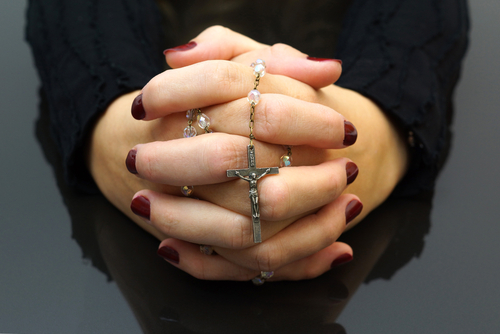When the woman lifted the bowl of bread toward me, I looked her in the eye and took a piece from her hand. That’s what you do when bread is proffered: you cup your left hand into your right, and you take it. And I have taken it hundreds of times, on hundreds of Sundays. I have taken it from women, and I have taken it from men, and I’ve gummed and chewed and wished for water instead of the inevitably sweet wine that follows.
But this Sunday, I took it from her after she’d consecrated it. I had gone into my car, out of my car, onto a train, onto another train, under the San Francisco Bay, into the Mission district, through the Mission on foot, up a hill into Bernal Heights, and into an Episcopal church. Did anyone at my Catholic church notice I was missing? Probably not. There are too many things I do there, committees and teaching and groups and cooking and cleaning, but my absence would not be notable because I sit in a pew instead of standing at the altar or the ambo. I’m just another woman, looking for the transcendent, waiting for a sign… but mostly, filling a seat.
Vocation filters in and out of conversations with other Catholic women. “What if…” and “those guys don’t…”,“respect” and “dignity” and “Mary Magdalene”, and “even deacons get to…”. Women come running up to me after Mass. “Did you see…”, “You should write…”, “Can you tell….” Emails float into my inbox from women. “I was denied…”, “He wouldn’t absolve…”, “Couldn’t read the Gospel…”
Years before: “I had a calling,” said the 80-year-old Sister, folding her hands and leaning back. “I was eighteen and God called me to this life. But then, the things we couldn’t say! Couldn’t even think! Couldn’t preach, couldn’t consecrate” couldn’t couldn’t couldn’t. She could not.
The Episcopal church has a woman presiding. She’s young—younger than me—and under her vestments she wears a pair of black ankle boots with silver studs. Her hair is twisted up at the back of her head. Her eyebrows are straight and black. And she sings the whole way through the service, sings in a slashing soprano, sings the welcome and the consecration and would likely sing the Gospel, too. But when it comes time for the Gospel, a middle-aged woman gets up from her pew and reads the words of Luke. The Beatitudes. Blessed are you, and you, and you and you and you. But woe to you. Woe to you, and you, and you.
That’s the knife in the heart, right there, that middle-aged woman, who looks like any woman I see on the train, any woman I pass in the library. Who looks like I will look in twenty-odd years. Who is not ordained, but who gets to read the Gospel. Which, well, Catholic women. We can’t.
Years before, another female Episcopal priest tells me that the great feminist theologians are all Catholic for a reason, “because they’re still fighting. Because they’ll be fighting for some time to come.”
We can’t bless the bread, or tear it with our hands. But look closely—in the pews, in the back, some of us are lifting our hands. We can’t read the Gospel. But we read everything else. We can’t baptize the children we might bear, lay our dead to rest with those words of grief and consolation; we can’t preach, we can only offer a “reflection” once in a great while. We can’t. We cannot.
So I waited for a difference, watching this Episcopal priest, this young, stylish woman with her beautiful voice, in this exquisite wooden church on a hill, where the congregation was busily assembling good-looking food in the kitchen before the service started, when I stumbled in looking for a garbage can. I notice when food looks and smells good. What can I say; I’m always hungry. I’ve always been hungry.
But in that “cannot” I have heard in my church, in the church I freely choose when it tells me all of the things I can’t do, I’ve never felt denied to the point of resentment. Because, vocation? My vocation isn’t behind an altar. My vocation is putting my ass in a pew, week after week. My vocation is the vocation of billions of people, in nearly every religion. It is the vocation of showing up.
That’s not the case for quite a few women I know. Either they leave Catholicism and pursue vocation in another church, or they stick it out with rage simmering under their skin, week after week. “Can you believe…” “Denied…” They cannot do what they feel called to do, so they go, or they rage, or they simmer. Or they give up: on their vocation, on religion, on God. Or they stay, and they push and they push in increments.
When I took the bread from the female priest, I wondered about the ontological difference. What difference did it make that her hands were female? That the breath she used to push out the sacred words was female? That her female soul had brought God into being in the yeast and wheat? Did she look into my eyes and see a Catholic woman who hears Catholic women suffering because women don’t hand them transformed bread?
She looks at me and she turns to the next person and I chew and swallow. And in that moment I realize believing in transformed bread is not just believing that the person who performs the act is somehow different from the recipient. It is not about the gender of the person who performs the act: it’s about the act. It’s about the recipient. It’s the gift. It’s the food. Whatever church we walk into, whoever says the words that make it shift, we hold out our hands, and we are given bread.


